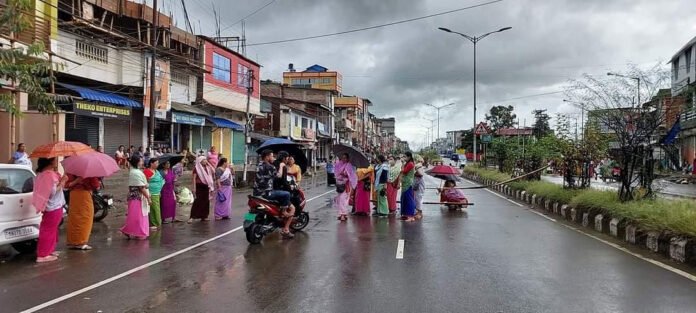Manipur, nestled in the northeastern corner of India, recently found itself engulfed in turmoil as a 48-hour bandh, or shutdown, brought daily life to a grinding halt. Such bandhs, often called by various groups to protest against government policies or to demand specific actions, have become a recurrent phenomenon in the state. However, the latest bandh left a profound impact on the lives of ordinary citizens, disrupting routine activities, economic transactions, and public services.
The bandh, called by [insert name of the group or organization], was intended to draw attention to the grievances of certain sections of the society. While the underlying issues may vary, the consequences of such bandhs remain consistent – widespread inconvenience, economic losses, and social unrest. In Manipur, the 48-hour bandh paralyzed the state, affecting all aspects of daily life.
One of the most immediate and visible impacts of the bandh was the disruption of transportation services. Roads remained deserted as vehicular movement came to a standstill. Public transport services, including buses and taxis, were suspended, leaving commuters stranded and unable to reach their destinations. Businesses that rely on transportation for the movement of goods faced delays and losses, exacerbating the already challenging economic conditions.
Moreover, the closure of educational institutions posed challenges for students and teachers alike. Schools and colleges remained shut, disrupting academic schedules and hampering learning outcomes. The bandh disrupted examinations, lectures, and extracurricular activities, depriving students of valuable educational opportunities and adding to the uncertainty surrounding their academic future.
The healthcare sector also bore the brunt of the bandh, with hospitals and medical facilities grappling with reduced staff and limited resources. Patients requiring urgent medical attention faced difficulties in reaching hospitals, exacerbating their suffering and compromising their health outcomes. Moreover, the disruption in the supply chain of essential medical supplies and medications posed a serious threat to public health and well-being.
Small businesses and entrepreneurs faced significant losses as a result of the bandh-induced shutdown. Shops and markets remained closed, depriving traders of their daily earnings and disrupting economic activities. The financial repercussions of the bandh were particularly severe for marginalized communities and daily wage earners, who rely on daily income to meet their basic needs and sustain their livelihoods.
Additionally, the bandh had a ripple effect on essential services such as banking, telecommunications, and utilities. Banks remained closed, disrupting financial transactions and causing inconvenience to customers. Telecommunication services were also affected, hindering communication and connectivity across the state. Furthermore, power outages and disruptions in water supply added to the woes of residents already grappling with the challenges posed by the bandh.
Amidst the disruption and chaos, there was a palpable sense of frustration and resentment among the residents of Manipur. Many expressed their displeasure at being held hostage to the whims of various groups and organizations, whose bandhs disrupt normal life and impede progress. The recurring cycle of bandhs has led to a sense of disillusionment and disillusionment with the state’s governance, with citizens calling for greater accountability and responsiveness from the authorities.
While bandhs may serve as a means of expressing dissent and drawing attention to pressing issues, their indiscriminate imposition often comes at a high cost to society. The 48-hour bandh in Manipur underscored the urgent need for dialogue, consensus-building, and constructive engagement to address grievances and resolve conflicts. It also highlighted the importance of strengthening democratic institutions and mechanisms for conflict resolution to prevent the recurrence of such disruptive protests in the future.
In addition, the 48-hour bandh in Manipur left an indelible mark on the lives of ordinary citizens, disrupting routine activities, economic transactions, and public services. The widespread inconvenience and economic losses incurred as a result of the bandh underscore the urgent need for constructive dialogue and consensus-building to address grievances and resolve conflicts. As Manipur strives for peace, progress, and prosperity, it is imperative that all stakeholders work together to build a more inclusive and resilient society that prioritizes the well-being and aspirations of its citizens.



